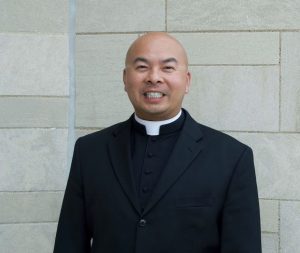 If we lack discipline in our lives, we can often feel weighed down—spiritually, physically, and even materially. There is a reason why simplicity movements have become so popular these days. There is something liberating about not being weighed down by a lot of stuff. We regularly need to shed the excess in our lives, so as to be free and responsive to God’s will and the needs of our family, our parish, and our community.
If we lack discipline in our lives, we can often feel weighed down—spiritually, physically, and even materially. There is a reason why simplicity movements have become so popular these days. There is something liberating about not being weighed down by a lot of stuff. We regularly need to shed the excess in our lives, so as to be free and responsive to God’s will and the needs of our family, our parish, and our community.
Lent’s three traditional practices of Prayer, Fasting, and Almsgiving help us shed that excess.
1. Prayer daily fights against the excess of meaningless activity.
2. Fasting fights against excessive sensual pleasures that distract us from fulfilling our vocation and purpose in life.
3. Almsgiving fights against the excess of materialism and worldly concerns that distract us from recognizing and living for the most important things in life: our love of God, family, and neighbor.
We moderate these secular pursuits not because we think worldly concerns, sensual pleasures, and material things are bad. That would be puritanical; we Catholics are not Puritans and recognize them as gifts from God. But when these things are unchecked, they can too quickly dominate our lives and even enslave us.
Lent is a time to ensure that we are the master of these things in our lives, ordering them to serve God’s purpose and meaning for my life, rather than those things mastering us.
Below are just a few suggestions and opportunities that we offer here at the parish:
Prayer
1. Read the Gospel for the day. The daily readings are listed in our bulletin. Use the Scriptures as a springboard for your own conversation with God. If you need a little more guidance to get that dialogue going, sign up for Fr. Barron’s brief Lent reflections on the Gospel for the day emailed to you each day. The popular Matthew Kelly also has a daily email devotional, available here.
2. Stations of the Cross at 5:30 p.m. each Friday at St. John Church and 6:00 p.m. each Thursday at St. Joseph Oratory. Immediately after Friday Stations, Deacon Dave Etters will have a Lenten Study on “How Our Souls Walk with God,” taking us deeper into a more intimate prayer life with the Lord.
3. “O Come, Let Us Adore Him” – a powerful evening of Eucharistic adoration, beginning with a half an hour of praise music, followed by a holy hour with Jesus in the Blessed Sacrament that culminates with a moving procession around the interior of the church.
4. Adoration Chapel – Commit an hour of prayer a week to be before the holy presence of Jesus in the Eucharist at the St. Joseph Adoration Chapel in the old convent on the corner of Leroy St. and East Ave. Reflect upon the Gospel for the past and/or upcoming Sunday and the key inspirations you’ve written in your Mass Journal. Put into practice the A-R-R-R method of prayer we have been practicing. Pray your rosary and ask Mary to give you her eyes to see Jesus with her pure and unconditional love.
Fasting
1. Ash Wednesday and Good Friday are the two obligatory days of fasting and abstinence. Every Friday of Lent, moreover, is an obligatory day of abstinence from eating meat. What is the minimum to be considered fasting? “When fasting, a person is permitted to eat one full meal, as well as two smaller meals that together are not equal to a full meal.” That, of course, is sometimes more than what much of the third world receive on any given day, so feel free to be stricter in your observance. For many, Wednesday is also an additional day of fasting. There are also other forms of fasting such as having simply bread and water.
2. “What are you giving up for Lent?” You often hear that question. Fasting doesn’t involve just food. We can also give up or fast from other things such as habits that have become unhealthy. For many in our technologically driven world, that is a “Facebook Fast” or fasting from social media altogether. It can mean fasting from listening to secular music. In its place, you can listen to Good Shepherd Catholic Radio, Christian music (I recommend Lauren Daigle!), or to Catholic talks from Fr. Mike Schmitz or Bishop Barron that you can download from Formed.org. See the Formed “how-to” cards in the pews.
Almsgiving
1. The Houses of Mercy in our churches, in which we place donations for the less fortunate, will go to help disadvantaged seniors and youth this year. Please see the article about our Lenten Project on page 5 in our bulletin.
2. The Diocesan Services Appeal supports our Catholic Charities of Jackson County and the other four Catholic Charities agencies in our diocese. This includes providing counseling for those racked with addiction, which we know so afflicts our Jackson community. Next week, you will receive more information about the many other ministries the DSA provides. Many of you seasoned Catholics are doing most of these. If you’re new to Lenten observances, however, keep it simple at first. Start by choosing just one from each of the three practices, and practice that faithfully.
Have a blessed Lent!